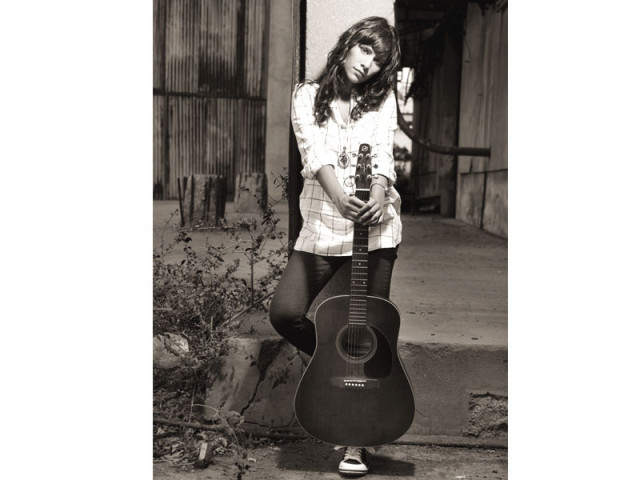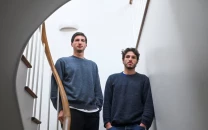Strumming along Zoe Viccaji
Ms.T goes one-on-one with the talented Zoe Viccaji.

PHOTOGRAPHY: RIZWAN-UL-HAQ FOR LEVI’S
In an exclusive interview with The Express Tribune, Zoe discusses how it all began, her experiences along the way and where she stands now as a budding musician.
1. How has life been since Coke Studio? From what we see on your Facebook page, you’ve been performing back-to-back gigs!
It’s been quite eventful actually… no pun intended! I’ve been recording a few songs for films and wrapping up my first album, so doing that along with live shows has been a bit of a juggling act. I’ve always loved performing on stage, and it’s where I’m happiest. I just wish there were more public shows than private ones. Post mid-2013 we have some surprises in store!
2. You’ve been playing guitar and writing songs since the age of 15. How would you say you’ve matured in your music?
I think my style of writing has stayed pretty much the same; the content, of course, has matured but somehow the way I talk about it seems to have carried through. It’s a lovely way of realising that, at a core level, I am the same tomboy who is fascinated by the same things. I feel that my style of singing and voice, however, have developed a lot more. Like an instrument, I have learnt so much more about my expression through exposure and practice. I really enjoy the fact that there is always room to grow.
3. It seems that almost your entire family, including your brother, mother and sister, are musicians! Tell us about them.
They’ve all been involved in music in some way or the other, including my grandmother who sang on radio a few times. Music was a part of my mother’s social life: most of her friends either sang or played an instrument. While growing up, I can remember that every party or beach picnic had someone strumming a guitar and everyone singing along. It was something I grew up with and maybe took for granted for a long time. At the age of fifteen (I think it’s about time I admitted this) I picked up the guitar because my brother showed a keen interest in learning how to play, and I just loved doing everything that he did. He wrote a few songs and had a band (Drift) for a while, and then shifted his focus onto filmmaking, which he’s equally fantastic at. Rachel is a natural born singer; she can hear a song once and then sing along the next time in perfect harmony. It’s really fun performing with her when we do get to go on stage together.
4. Before becoming a solo artist, you were with quite a few bands, including one called ‘Ganda Bandas’ — was the transition difficult when suddenly it was just you?
I don’t remember having to go through any difficult transition. Singing with ‘Ganda Bandas’ and other bands was very different. They had their own sound, and the selection of music was guided by their style, which was fun in its own way. When I went solo, I selected music that I liked, and things that suited my voice. Now when I do live shows, I find myself striking a balance between what I enjoy and what the audience enjoys.
5. You have also been a part of theatre in the past, musicals to be specific — any chance of doing that again sometime in the future? Do you miss it?
I miss it very, very much! I used to really thrive on musical theatre, because it was just the perfect marriage of acting and singing. I’m constantly concocting plans of putting on a musical at some time in the near future, so yes I think I will definitely return to it!
6. Do you have any official training in music? Do you have a daily vocal training regime you follow?
When I was in college I took a semester’s worth of vocal training, and then did a two-month stint at a music conservatory in New York. I also had an ustaad for a while to become more acquainted with eastern music — no regular official training in music. I would say that most of my training has been experience. While I am doing shows and recordings, I do have a daily vocal regime. It’s a mixture of what I learnt in both the west and in Pakistan.
7. Tell us about Bichra Yaar featuring Strings — the song and the video.
Levi’s first approached me to do a rendition of any song I liked, and I was just in the middle of making an acappella track, so it seemed only natural to do an acappella song for them. I’ve always loved the composition Bichra Yaar, and felt its melody was really strong. Once I had composed and arranged the vocal parts, it’s only then that the director Adnan Malik suggested that we invite Strings to feature in their own song. I don’t think I would have ever imagined it, otherwise. Everything seemed to fall into place quite smoothly.
(The video can be viewed via facebook here)
8. How much of an issue has YouTube’s ban had on you personally, and on other musicians in Pakistan, in your opinion?
It hasn’t stopped me from making music or videos, but it has definitely affected the level of distribution for our work, which indirectly harms our determination to keep making videos. Even though most of us have downloaded proxies, it still isn’t the same thing as having an open channel. Also, I used to depend on YouTube for a lot of tutorials, and proxies slow it down so much that I’ve just gone off even trying. I tried starting a dialogue but decided to back off.
9. Which has been your most favourite live show performance so far, and why?
My first solo show in 2011 was nerve-wracking, but still a big occasion for me since it was my first show, and the audience was made up of so many friends. I really love a show when the audience is having fun.
10. We know what it’s like being in a crowd staring up at a performer at a gig, but how does it feel to be a performer, singing in front of a large crowd of people all staring at you, and listening intently to every word you have sung? How do you as an artist prepare for that?
When I first started performing, there would be a noticeable quiver in my voice during the first few songs. With experience I’ve gained a lot more confidence, but I still get nervous before going on stage — there’s no way you can be completely prepared for the audience, because so much of your performance depends on who they are and how they’re responding. That’s half the fun of it all.
11. So what is Zoe’s daily routine like? How do you keep fit and are you following any specific diet?
I’m a bit of a night owl at the moment, but I still aspire to the early-to-bed and early-to-rise routine. I spend quite a bit of time in the studio, and rehearsing for shows these days; and often need to remind myself to take a break. “Diets are too little of a good thing” as Garfield once said — I eat pretty much what I want most of the time, but then I love running and yoga, so that makes up for the eating.
12. As a female artist in Pakistan, do you feel it is easier to gain support and fame or harder?
I don’t think being a male or female has anything to with it. The goal for me isn’t fame as much as it is to make music that is true to myself and to work with good people. I guess the two go hand in hand to a certain extent, but fame should ideally be a byproduct.
13. Would you call yourself a fashion conscious person? What kind of attire are you most comfortable in, on and off-stage?
I’ve only now started to become a little more tuned into what I wear and how I present myself on stage — mostly because of the constant goading of friends who are looking out for me. I like to keep it simple and just be comfortable.
14. With everything that’s going on in Pakistan at the moment, would you say music factors in as an important outlet for both musicians and those listening?
I think it’s one of the most important outlets. It keeps me grounded, and it helps me stay happy, so I can only imagine that it does the same for others.
15. What plans do you have for the releasing of an album? Do you think you would be going across the border for projects in the future, as many other Pakistani musicians have done?
I can’t say much about my plans for the release as it is still underway, but I will say that doing music around the world is in sight. While I want to continue doing most of my work here, avenues for live performances are limited in Pakistan, and I realise that my growth extends beyond geographical borders.
16. What do we get to see next from you in terms of releases?
I’ve been working with the very gifted producer Zohaib Kazi on a new EP, and since we plan to release our work in singles, I see the next piece coming out of the Zoe & Zohaib project. There’s also a song that I’ve been working on with Omran Shafique and Meher Jaffri for the film Seedlings, and I think that will also see the light of day pretty soon.
Published in The Express Tribune, Ms T, March 17th, 2013.
Like MsT on Facebook for your dose of girl talk.


















COMMENTS
Comments are moderated and generally will be posted if they are on-topic and not abusive.
For more information, please see our Comments FAQ